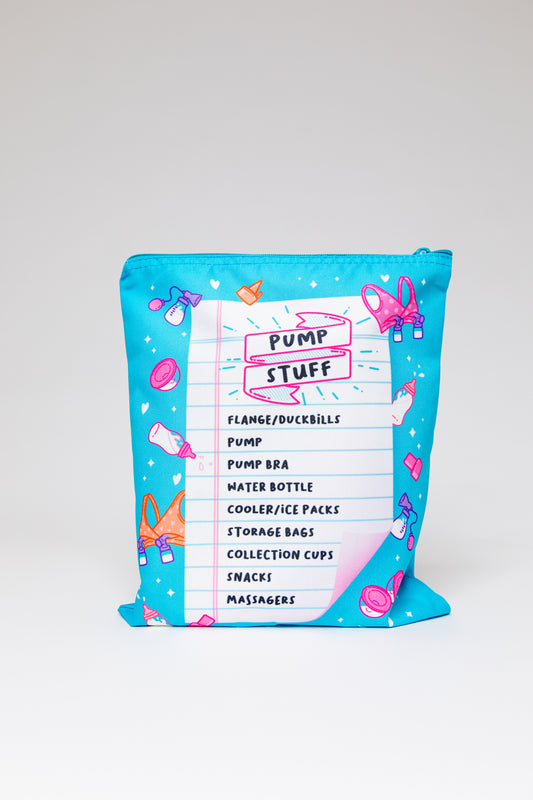
Why Communication Matters for Breastfeeding Moms
Breastfeeding isn’t always just about you and your baby. Effective communication with all involved parties can make or break your breastfeeding journey. Whether you’re discussing your feeding plan with a healthcare provider, setting boundaries with family members, or explaining to your boss why pumping in a storage closet isn’t ideal, good communication is key.
When to Start Talking About It
The short answer? Now. Whether you’re a pregnant woman planning to breastfeed or a new mother navigating the early months of life with a newborn infant, the sooner you start discussing expectations with the people around you, the better. Conversations during prenatal care can help you feel prepared, and ongoing communication postpartum can ensure you get the emotional support and practical help you need.
What to Communicate About
New moms have to make lots of decisions when it comes to how to take care of their new baby. Many of those decisions revolve around feeding and recovery following birth. Here are some things you may want to consider forming opinions on now so that you can communicate your desires to others when the time comes.
Your Feeding Plan:
Now, don’t get me wrong. It’s okay (and encouraged) to be flexible when it comes to expectations surrounding breastfeeding. But, in general, are you planning on exclusively breastfeeding? Exclusively pumping? Combination feeding? Are you open to formula feeding? Be clear about your goals with yourself so that you can communicate them to the people closest to you.
Common Problems:
Engorgement, cracked nipples, cluster feeding—make sure those around you know what’s normal and when to call in reinforcements like lactation consultants or other healthcare professionals.
Postpartum Recovery:
Whether you had a vaginal delivery or a c-section, your body needs time to heal. Set some clear expectations with your support system about your physical limits while you recover. Need some items to aid in your recovery? See my Vaginal Birth Must-Haves and C-Section Must-Haves in my Amazon shop!
Advocating for Your Needs & Boundaries
Following birth, emotions are high and it can feel like the weight of the world is on your shoulders. The good news is that people usually want to be helpful, they may just not know how. So, it's up to you to ask. When it comes to communication tips for breastfeeding mothers, there are a few best practices you should try to remember:
-
Use Simple Language: No need for a TED Talk—just be direct. You don’t need to explain the “why” behind what you’re asking for.
-
Practice Active Listening: If someone isn’t getting it, ask open questions to hear their point of view, then guide the conversation. If you need to step away, that's okay.
-
Use Non-Verbal Cues: You may want to come up with a signal that you and your spouse use when you need something. For example, flash the signal and dad knows to take the baby or entertain older kiddos because mama needs five minutes to compose herself. Or, use a signal when you need "rescued" from an uncomfortable conversation you can't seem to get out of. We've all been there.
- Don’t Be Afraid to Set Limits: Need visitors to leave? Check out my podcast episode on how to politely ask someone to go home (Episode 19 - No Visitors Please).
Talking to Your Support System

Your Partner
Listen, you are not a one-woman milk factory. Your partner plays a vital role in your breastfeeding journey. Hopefully your partner is off work for some time to help you in the early days, but even if not, these things are helpful for times when he is home. There were definitely times when it was just me taking care of my babies with minimal support. It’s possible to do it all, but “doing it all” doesn’t have to look the same as it did before you had kids. If all you do in a day is keep your baby fed, clean, and mostly happy, that is a WIN. Have a conversation with your partner to discuss the things that they can help with while they are home:
-
Know How to Support You: When you are nursing the baby or pumping, offer to bring snacks, burp the baby following a feed, change a diaper, or simply sit next to mom and baby for company.
-
Go Above and Beyond: Sometimes you have a list of things you want to accomplish over the course of a day, but with a new baby, it can be tough. Lean on your partner to help wash pump parts or bottles, take care of laundry, cook dinner, or cuddle the baby when you need a break.
-
Understand the Health Benefits: Have an intentional conversation with your partner about why you are passionate about breastfeeding. A little knowledge about human milk and the benefits of breastfeeding can go a long way in getting their support. How do you want your partner to respond when you express frustration with breastfeeding? Whether it’s nipple pain, feeling isolated, or anything in between, it’s helpful if your partner can say something like, “Thank you for working so hard to nourish our baby. What can I do to help?” If you are pumping, having your partner bottle feed is always a nice break.
- Help with Older Kids: During the early days when everything is so new and overwhelming, any help you can get with your older children is welcomed. Encourage dad to plan some fun things to do with your other kiddos that get them out of the house so that you and your newborn can snuggle and get some rest. Speaking of older kids…
Older Children
If your older kids have never seen breastfeeding before, prepare them.
-
Explain What’s Happening: Use simple language to talk about breastfeeding and why babies need milk from mom. If you’re pumping, show them the pump parts, let them feel the suction on their hand, and if you’re comfortable, show them how the pump works when attached to your breasts. Explain that babies and moms need space and time to get used to this way of feeding (especially if you are nursing), and that sometimes it can be frustrating when mom isn’t available. And too, that feeding sessions won't always take as long as they do in the early days.
-
Set Boundaries: Make sure your kids know what they can and can’t do while you are breastfeeding. “You can sit with me, but no climbing on me while I nurse.” “You can look at my pump when it's working, but you may not touch.” “When baby is nursing, do not touch them as it might distract them from eating.” “Use quiet voices while baby is nursing.” If you have toddlers, consider getting out a special box of toys that they can only play with while you are feeding the new baby.
- Give Them a Job: Can they bring you a burp cloth? A diaper? Can they help with a bottle feed? Giving them a role can ease sibling jealousy.
In addition to communicating with your older children about breastfeeding, make one-on-one time with them a priority. You will both enjoy it!
Your Employer
Returning to work? You’ll need a plan. Check out my ultimate guide to pumping for a baby in daycare for all the details.
-
Know Your Rights: Federal laws protect your right to PUMP AT WORK.
-
Find a Space: No, a bathroom stall or your car are not the only options. You deserve much better.
-
Schedule Your Breaks: Milk production depends on consistency of milk removal, so advocate for pumping times that work for you.
- Store Your Parts: Ask if there is a fridge for you to store your pump supplies.
If you’re unsure about the conditions you’ll be returning to at work when it comes to pumping, here’s a sample email or phone conversation you can have with your employer:

Your Healthcare Professionals
Your healthcare providers—OB, primary care doctor, and especially your baby’s pediatrician—play a huge role in shaping your breastfeeding journey. But here’s the thing: not all of them are well-versed in lactation. Some pediatricians may jump straight to recommending formula supplementation if your baby isn’t nursing well for a full feeding session and/or isn't gaining weight quickly enough. They DO want the best for you and your baby, but again, they may not be experts on breastfeeding.
- Be Clear About Goals: If breastfeeding is your goal, make sure you guide conversations with your medical team by stating this upfront. Let them know that if your baby needs extra calories, you’d prefer to pump and bottle-feed before supplementing with formula. Increased milk removal signals your body to keep making milk—so skipping that step and just doing a formula feed can tank your supply. Now, if weight gain remains an issue despite pumping, you can cross that bridge when you get to it. Take a listen to my podcast Episode 28 - Increasing Milk Supply with Kelly Kendall.
- Relay Your Goal to All Involved: To ensure continuity of care, discuss your feeding plan with all relevant providers, including your OB during hospital care, your pediatrician at subsequent checkups, and any lactation consultants you work with. Having a united front within your health system can prevent unnecessary stress and confusion.
- Ask for Support and Advocate for Yourself, If Needed: This approach is not just about feeding—it’s about patient-centered care that prioritizes both your baby’s health outcomes and your mental well-being. Breastfeeding can be quite stressful, so please be careful to watch for signs of postpartum depression. If you do notice some of the signs, communicate openly with your health care provider. Make sure to ask for access to additional resources that align with your goals. If your provider isn’t on board, don’t hesitate to seek out someone who is. Your feeding choices deserve to be respected, and your provider’s role in patient care should include supporting you, not undermining your efforts.
Extended Family & Friends
Not everyone understands or supports breastfeeding, and that’s just the way things are. But they do need to respect your choices as a parent. You should not feel pressured to feed your baby a certain way just because your great aunt doesn’t want to sit in the same room as you while you nurse or your grandma is uncomfortable with you pumping in front of her. You know what is best for you and your baby. Go with your gut, mama. Here are some of my communication tips for breastfeeding mothers when it comes to being around extended family and friends.
-
Shut Down Unwanted Advice: A simple “this is what works for us” should do. Or, a nod and “thank you for your suggestion” will suffice. Not everyone will agree with how you are doing things as a new parent, but that’s not your problem. Be confident in the decisions you have made for your family.
-
Set Social Boundaries: Want people to check before dropping by? Say so. It’s perfectly acceptable to send out a mass text to close friends and family announcing the birth of your precious baby and saying that you’d like a heads up if someone would like to visit.
- Delegate: It’s okay to delegate communication with friends and family to your partner so that you don’t have to worry about it. While we’re talking about communication, I also recommend having a friend or family member create a meal train link to send out. People like to offer support in times of need but may not know how. Meals are usually a much appreciated gesture post birth!
Communicating with Parents and In-Laws About Breastfeeding
Setting clear expectations early on with parents and in-laws can help avoid potential difficulty down the road. Make sure they understand that their social support and emotional support are what you need most—not unsolicited advice about whether the baby is eating enough or when you should start using a bottle or pacifier. With that, I encourage you to assume the best of their intentions. Most of the time, our close family members just want to help. They may not recognize when their “help” is doing more harm than good.
Create a supportive environment by using verbal communication to express your needs clearly. A simple “I really appreciate your help with meals and laundry so I can focus on breastfeeding” can go a long way. If they’re struggling to understand, remind them that their vital role is to support you in ways that make feeding your baby easier, not more stressful.
Keeping Communication Strong Postpartum
Communication isn’t a one-and-done deal. Keep checking in with your support system. And don’t forget that you and your partner are in this for the long haul. I promise you that keeping the romance alive matters! Need ideas? Read my post on dating your spouse after baby.
Final Thoughts
I hope these communication tips for breastfeeding mothers have encouraged you to speak up for yourself even when you're sleep-deprived and covered in breast milk. Though it may not seem like it, breastfeeding is quite a team effort, even if you’re the only one producing the milk. By using good communication strategies, setting boundaries, and making sure those around you understand your needs, you can make your breastfeeding journey smoother for everyone involved.






